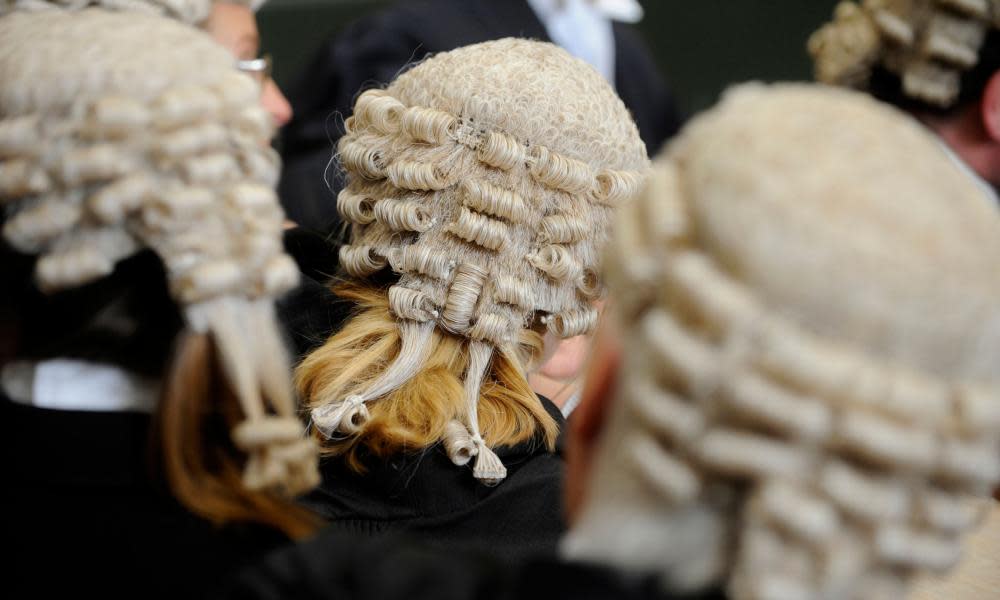Criminal barristers begin strike in row over legal aid fees

Criminal barristers in England and Wales are to begin a strike over legal aid fees on Monday, as they warn the profession is facing an “existential crisis” because of inadequate funding.
The Criminal Bar Association (CBA) said the offer of a 15% uplift in fees, which was the minimum increase recommended by the criminal legal aid review (Clar), is insufficient after swingeing cuts – and will not apply to the backlog of 58,000 cases in crown courts.
It says incomes have fallen nearly 30% over the last two decades and specialist criminal barristers make an average annual income after expenses of £12,200 in the first three years of practice, driving 22% of junior criminal barristers to leave since 2016.
Barristers participating in the strike on Monday spoke of being paid less than the minimum wage for court hearings when travel and hours spent preparing are factored in – and not at all when hearings are cancelled.
Mira Hammad, who is based in Liverpool, and was called to the bar in 2019, said: “The criminal justice system is falling apart. Cases aren’t going ahead because there aren’t enough barristers, there aren’t enough judges, there’s not enough court resources.
“As a criminal barrister you can’t earn enough, so I do inquest work as well as crime. If I was doing solely crime I would not be able to earn a living. It’s unsustainable for anyone involved in the system.
“The fact that there’s no funding in the system means that it’s also an incredibly stressful and frustrating job to do. You don’t get paid well and you’re constantly having to work within a system that is just completely dysfunctional.”
The walkout is the first by criminal barristers since 2014, until now the only time they have gone on strike. That too was over legal aid fees. CBA members supported action to secure fair fees in 2019, but it was suspended pending the outcome of Clar, which contained the 15% fee increase recommendation when it was finally published last December.
The CBA is angry that after the review took so long the government did not implement the pay rise immediately, but launched a consultation on the recommendations in March which only closed earlier this month. It wants a 25% rise to make up for years of real terms reductions.
Andrew Fitch-Holland, a criminal barrister based in Nottingham, who was called to the bar in 1990, said practitioners’ goodwill had been exploited.
“People are at breaking point, I’ve seen colleagues in tears,” he said. “I know of the level of personal debt people are taking on. We are all struggling to make ends meet and frankly sick and tired of not being paid for the work we do.”
He added: “We’re not being greedy, we’re not fat cats. There have been a series of brutal cuts to our funding at a time when also, over the years, the demands of the job have increased. So we’re not only getting paid less, but we’re being asked to do more for less. We have reached an existential crisis and the criminal bar is haemorrhaging members.”
Barristers will walk out on Monday and Tuesday initially, increasing the number of strike days by one each week, culminating with a five-day walkout in the week beginning 18 July. There will be picket lines at crown courts in London (at the Old Bailey), Birmingham, Bristol, Cardiff, Leeds and Manchester.
They will also not accept instructions for new cases and, continuing industrial action that they began on 11 April, will refuse to accept returns, where they step in to replace the original barrister at a court hearing that the latter can no longer attend. The action will lead to cases being delayed, exacerbating the backlog crisis.
The government has called the CBA’s decision “disappointing” and said the “unnecessary” strikes would only harm victims. It has questioned the CBA’s mandate for the action and claims a 15% increase would mean a typical criminal barrister earning about £7,000 extra a year.

 Yahoo Movies
Yahoo Movies 
